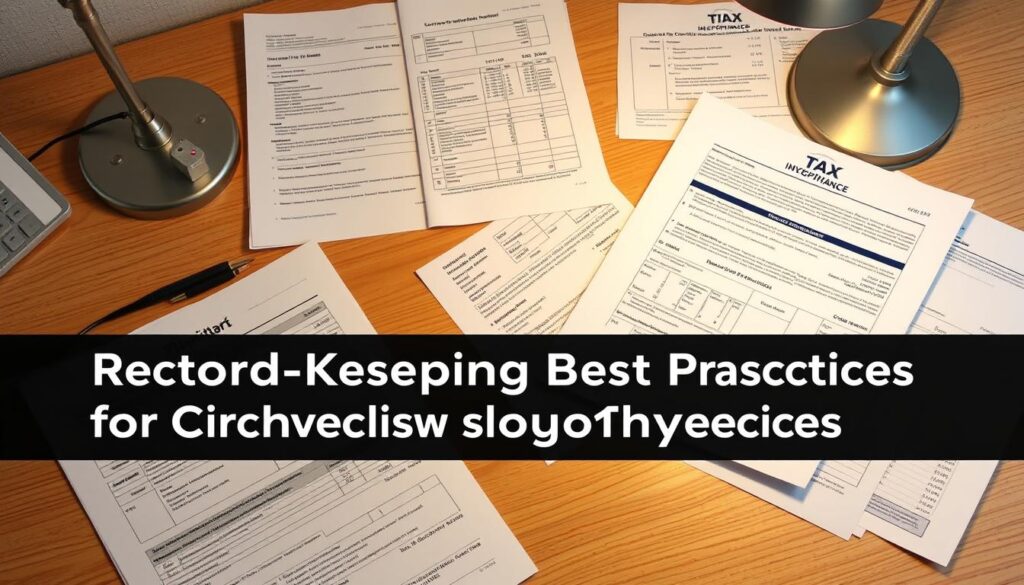The IRS is watching cryptocurrency activities more closely. This means crypto tax audit preparation is key for all investors. Keeping organized records is crucial to avoid penalties. Not following the rules can lead to audits, fines, and legal trouble.
Key Takeaways
- Accurate records are vital to defend against IRS inquiries.
- Audit risks rise with unreported crypto trades or inconsistent filings.
- IRS tools track blockchain transactions to identify discrepancies.
- Proactive crypto tax audit preparation reduces financial risks.
- Specialized software simplifies tax compliance for crypto investors.
Understanding Crypto Tax Audits and Why They Happen
Crypto tax audits are real and happening to many investors. The IRS looks closely at cases where reported income doesn’t match digital asset activity. Here’s what leads to audits and what to watch for:
Common Triggers for Cryptocurrency Tax Audits
- Large gains from trades or sales without corresponding tax filings
- Missing transaction records for exchanges or decentralized platforms
- Inconsistent reporting of staking rewards or airdrops
To avoid audits, crypto investors must close these gaps before the IRS finds them.
The IRS’s Increasing Focus on Digital Asset Compliance
Recent IRS efforts, like Operation Hidden Treasure, show more attention. Now, Form 1040 asks about virtual currency activity. Not reporting these changes correctly could lead to needing IRS crypto audit help.
What Makes Crypto Transactions Particularly Audit-Prone
Decentralized ledgers leave digital trails for auditors to follow. Pseudonymous addresses don’t keep you private—blockchain tools help the IRS track transactions. Trades across borders and changing values add to the complexity, making accurate tax reporting crucial.
The Essential Documentation You Need to Maintain
To plan your crypto taxes well, you must keep detailed records. This is crucial for proving you followed the rules during audits. You need to document every transaction, from buying and selling to earning rewards.
- Exchange and wallet statements: Save trade confirmations, withdrawal/deposit logs, and fee details for every platform used.
- Cost basis calculations: Track purchase/sale dates, prices, and fees to calculate taxable gains or losses accurately.
- Hard fork/airdrop records: Document event dates, asset values, and transfer details to clarify tax liabilities.
- Lost asset reports: Maintain records of lost/stolen coins, including police reports or platform confirmations.
- Deduction backups: Keep receipts for mining hardware, conference expenses, or software subscriptions tied to crypto investments.
Make sure your files are both digital and physical for 3-7 years. Use tax software to help track things, but always double-check your work. Without clear records, you could face IRS penalties. So, keep your records up to date with new transactions and rules.
Crypto Tax Audit Preparation: Creating Your Defense Strategy
Getting ready for a crypto tax audit means being clear and thorough. It’s about making sure your crypto taxes are solid. Here’s how to build a strong financial story:

Building a Transaction Chronology
Keep track of all your crypto activities in order. This includes buying, selling, earning rewards, and using DeFi. Use timestamps to show when each transaction happened.
For example, log when you sold an NFT or mined cryptocurrency. This helps prove you calculated your costs correctly.
Reconciling Exchange Records with Tax Filings
Match your Form 8949 with your exchange statements every month. Use tools like CoinTracking or Zulu Alpha to spot any differences. Fix any issues early on.
Discrepancies in gains or losses, or missing IDs, can lead to audits.
Organizing Deduction Evidence
Save receipts for things like hardware wallets, mining gear, and crypto software. For instance, keep records of hosting costs for nodes or fees for crypto courses. Also, document interest paid on crypto-backed loans to claim deductions.
Having solid documentation and regularly checking your filings is key. Making sure your records match your tax reports is crucial. This way, auditors won’t find anything to question.
How the IRS Identifies Crypto Tax Discrepancies
The IRS uses advanced methods to find tax issues related to cryptocurrency. They use technology to spot problems in cryptocurrency reporting for tax audits. This ensures everyone follows the latest rules for digital assets.
Form 8949: The Audit Trigger
Form 8949 shows crypto sales and trades. If it doesn’t match Schedule D, it raises a flag. Here’s why:
- Systems check gains/losses on Form 8949 against Schedule D.
- Any mismatch in dates or values sets off alarms.
- Not reporting small trades can mess up total gains.
Blockchain Forensics in Action
IRS investigators use tools like Chainalysis Reactor and CipherTrace to track blockchain transactions. These tools:
- Follow transactions through wallets and exchanges.
- Find wallets tied to taxable events.
- Spot unreported income by analyzing wallet activity.
Public blockchain ledgers help auditors follow transaction histories. This makes it possible to track even anonymous crypto movements. Getting IRS crypto audit assistance means matching self-reported data with these tools. Being open about cryptocurrency reporting for tax audits helps avoid trouble and shows you’re following IRS rules.
Common Crypto Tax Reporting Mistakes That Invite Audits
Crypto investors often miss important details in cryptocurrency reporting for tax audits, which raises audit risks. Not reporting crypto-to-crypto trades as taxable events is a big mistake. Many think small gains don’t count, but every trade is important.
Misclassifying trading as investment income instead of business income can lead to penalties. This mistake is common and can cause big problems.
- Uncalculated cost basis errors: Using wrong methods like FIFO or HIFO without records leads to mismatches. Auditors find these by comparing blockchain data with reported values.
- Unreported airdrops and forks: Free tokens are taxable income. Not tracking these events means gaps in Form 8949 submissions.
- Wash sale rule violations: Selling and buying crypto in 30 days cancels loss deductions. IRS software spots these patterns quickly.
- Mixed crypto-business expenses: Claiming personal crypto purchases as business expenses is a big no-no. It can lead to fraud accusations.
Staking rewards and mining income are often not reported, but they’re taxable. Auditors use firms like Chainalysis to track every transaction. Investors must keep up with all activity in real time.
Using IRS-approved crypto tax software and keeping transaction logs is key. Proper tax compliance for crypto investors begins with accurate records and knowing IRS rules. Treat every crypto move, from DeFi swaps to NFT sales, as taxable events needing documentation.
Record-Keeping Best Practices for Crypto Investors
Keeping your records organized is key for crypto tax compliance. A clear system helps avoid mistakes during audits and makes tax planning easier. Start by listing every digital wallet and exchange account you use.
Make sure to note wallet addresses, linked IDs, and how you store private keys. Never write down sensitive info in places that aren’t secure.

Digital Wallets and Exchange Account Documentation
Keep track of all your transactions on platforms like Coinbase or Binance. Save monthly statements in cloud drives that are protected by passwords. Make sure to include withdrawal/deposit logs and fee schedules to meet IRS standards.
Transaction Categorization Systems
Use tools like CoinTracking or Koinly to sort your transactions. Label each one as a purchase, sale, airdrop, or staking reward. For instance, mark DeFi yield farming as income if it brings in new coins.
Timestamp Preservation Methods
Make sure to keep exact dates and times for every transaction. Blockchain timestamps help you figure out the value of assets when their prices change. Use audit trails by matching timestamps in trade histories with your personal records.
Navigating Complex Scenarios: DeFi, NFTs, and Staking
Crypto investors using DeFi platforms need to keep track of things like liquidity provision and yield farming. These activities can earn taxable income, which requires careful digital asset tax preparation. For example, staking rewards are seen as regular income by the IRS. Not reporting these can lead to audits, so keeping detailed records is essential.
NFTs bring more complexity. Buying NFTs sets a cost basis, and selling them can lead to capital gains. Creators of NFTs must report any royalties they earn each year. It’s important to report cryptocurrency for tax audits accurately, with all transaction details.
Staking also needs close attention. Stakers must keep records of rewards from protocols like Ethereum 2.0 or Solana. The IRS considers these rewards as taxable income when received, as stated in Notice 2014-21. Tools like CoinTracker or ZenLedger can help track, but manual checks are crucial during audits.
For all three, keep a detailed ledger with:
- Protocol names and dates of participation
- Fair market value at transaction times
- Smart contract addresses for audit trails
Crypto exchanges rarely send out Forms 1099 for DeFi or NFT activities. So, being accurate in self-reporting is crucial. Make sure to sync data between wallets, dApps, and tax software to avoid errors.
Complex crypto activities need a proactive approach. Auditors look for irregular patterns, so consistency between blockchain data and tax returns is key. Focus on clear digital asset tax preparation to stay compliant with changing rules.
Software Solutions for Crypto Tax Compliance
Automated crypto tax tracking tools make crypto tax planning easier and cryptocurrency reporting for tax audits smoother. They collect data automatically, cutting down on errors that can attract IRS attention. It’s crucial for investors to choose software with strong audit-ready features.
- Transaction categorization by type (trades, staking, DeFi)
- Cost basis calculation methods (FIFO/LIFO/HIFO)
- IRS Form 8949 and Schedule D export options
- Audit trail documentation with transaction timestamps
Features to Look for in Crypto Tax Tracking Platforms
Top platforms like CoinTracker and Koinly track cost basis automatically. ZenLedger focuses on Form 1040 reporting, while TokenTax handles NFT and DeFi protocol analysis. When choosing, compare based on supported blockchains and how well they can customize audit reports.
Data Integration Capabilities Across Multiple Exchanges
Good software connects with big exchanges like Coinbase and Binance through APIs. It should also handle CSV imports for old data and track multiple wallets. DeFi platforms like Uniswap need direct integrations to track yield farming correctly.
These tools create summaries ready for audits that follow IRS rules. They keep up with new crypto tax laws, protecting investors from fines.
Working with Cryptocurrency Tax Audit Services
When dealing with complex crypto tax rules, getting professional help is key. Crypto tax audit services provide the needed expertise to handle IRS audits. They help ensure you follow the rules and avoid fines. It’s important to choose the right advisor for your needs.
When to Engage a Crypto Tax Specialist
Here are times when you should get professional help:
- High-frequency trading or frequent crypto conversions
- Engagement with DeFi protocols or staking rewards
- International crypto transactions or offshore accounts
- Unresolved discrepancies in past tax filings
- Receiving an IRS inquiry or audit notice
Questions to Ask Before Hiring Professional Assistance
Ask these questions to find the right professional:
- Do you specialize in IRS crypto audit assistance for blockchain transactions?
- What audit defense strategies have you implemented for similar cases?
- How do you handle cross-border crypto transactions?
- What fee structures do you use for audit-related services?
- Can you explain your process for reconciling blockchain data with tax filings?
Look for certified experts like CPAs or enrolled agents with crypto experience. Tax attorneys might be needed for tough disputes. Make sure they know IRS rules like IRS Notice 2014-21 and recent crypto audit outcomes.
Responding to an IRS Crypto Audit Notice
Getting an IRS audit notice means you need to act fast and be organized. First, check if the notice is real by matching the sender with the IRS. Make sure you understand the deadline mentioned. Good crypto tax audit preparation helps you quickly get all the necessary documents ready.
- Correspondence Audits: You’ll need to send documents by mail. Make sure to explain your transactions clearly.
- Office Audits: You’ll meet with auditors in person. Prepare a summary of your crypto activities for them.
- Field Audits: Auditors will visit you. Keep your digital records well-organized to make it easy to find documents.
Organize your documents in order, pointing out important events like sales or exchanges. Use blockchain explorers to confirm when transactions happened. Stick to facts and avoid making things up. For tricky situations like DeFi staking or NFT sales, explain how they work in simple terms.
If you’re unsure, get help from IRS crypto audit assistance experts. They can help write your responses or talk to auditors for you. Don’t wait too long to reply; missing deadlines can lead to fines. Be clear and to the point, using charts or timelines to show your crypto activity.
Audits are a chance to fix past mistakes. Being open and providing solid evidence can help your case. Keep copies of everything you send for your records.
Your Rights During a Cryptocurrency Tax Audit
It’s important to know your rights during a crypto tax audit. The Taxpayer Bill of Rights protects you. It ensures you have the right to professional help and can appeal audit decisions. Understanding these rights is key to preparing for a crypto tax audit.
Timeframes and Extensions
Every audit has strict deadlines. Here are some important ones:
- Respond to audit notices within 30 days to avoid penalties.
- Write to request extensions if you have complex crypto records.
- The IRS usually has 3 years to finish audits. But, they can extend it if they suspect fraud.
Communication Protocols with Auditors
Communicate with auditors through written channels. This helps protect your rights. Here’s how:
- Make sure all talks are in writing to avoid confusion.
- Don’t share financial info not asked for unless you must.
- Get advice from IRS crypto audit experts before agreeing to anything.
Using these rights helps you follow the rules without giving up your protections. Always keep copies of everything you send in. This is part of being ready for a crypto tax audit.
Tax Consequences of Crypto Investments: What Auditors Look For

Auditors carefully check how investors report crypto activities under tax laws. They focus on tax consequences of crypto investments like short-term vs. long-term gains. They also look at ordinary income from staking or mining and self-employment taxes on profits.
- Capital Gains Timing: Short-term gains face higher tax rates. Auditors compare holding periods with reported filings.
- Income Reclassification: Mining rewards or airdrops might be seen as ordinary income, not capital assets.
- Foreign Holdings: Unreported offshore wallets or exchanges could break FBAR rules, leading to penalties.
Examiners compare digital asset tax preparation records with blockchain ledgers to find differences. They check trade logs, fork events, and asset conversions for correct cost basis. Missing Form 8949 entries or incomplete Schedule D disclosures often lead to deeper reviews.
Common red flags include:
- Unexplained losses used to offset income
- Inconsistent valuation methods
- Lack of documentation for donated NFTs or DeFi yields
Managing tax consequences of crypto investments proactively means tracking every transaction’s details. Using software that logs trades and integrates IRS forms helps with digital asset tax preparation. Auditors also look at crypto used as payment, which often faces payroll tax obligations that are missed.
Audit-Proofing Strategies for Different Types of Crypto Activities
To make sure you’re compliant in a crypto tax audit, adjust your digital asset tax preparation to fit your activities. Each type of investment needs its own strategy. This ensures you have the right documents to avoid trouble.
Mining Operations Documentation
- Keep track of when you bought your mining gear and any upkeep costs. These are business expenses.
- Save your electricity bills related to mining. This helps you deduct expenses correctly.
- For mining equipment, use IRS-approved methods like straight-line depreciation.
Trading vs. Long-Term Holding Evidence
For traders, here’s how to audit-proof your crypto taxes:
- Keep detailed records of your trades. This shows you’re eligible for short-term gains.
- Write down how long you’ve held your crypto. This is key for lower capital gains rates.
- Use software logs to prove your cost basis for each sale.
Cross-Border Transaction Compliance
Foreign crypto dealings need strict following of:
- FATCA and FBAR filings for accounts over $10,000 abroad.
- Keep logs of currency conversions using official rates at the time of transaction.
- Have proof of your offshore exchange holdings, like account statements and transaction receipts.
Good digital asset tax preparation for global dealings avoids penalties. Check out currency conversion rules for cross-border gains.
Recovering from an Unfavorable Audit Outcome
Getting a bad audit result can lead to unexpected tax debts or penalties. First, look into formal appeals or legal options. The IRS Office of Appeals lets taxpayers contest findings without going to court. If that doesn’t work, Tax Court petitions are another way to challenge decisions.
If you owe more taxes, you might be able to set up a payment plan. Installment agreements or streamlined offers in compromise can help. Professional services like cryptocurrency tax audit services can check if you qualify for these based on your income and assets.
Recovering after an audit means making your tax reporting better. To audit-proof your crypto taxes, update how you track transactions. Use automated crypto tax software or third-party services to keep records easy. Make sure your cost basis and holding period calculations are correct to avoid future issues.
Recovering emotionally and financially means taking action. Go over the audit findings to find where you might have missed something. Services like cryptocurrency tax audit can help review your records. Start keeping better records, from wallet logs to staking event records, to build a stronger compliance base for the future.
Future-Proofing Your Crypto Tax Approach
Keeping up with changing crypto tax rules is key. Investors must stay on top of tax compliance. It’s important to regularly check IRS updates and follow tax blogs.
Tools like CoinTracking and Koinly make tracking easier. They help with forms like Form 8949. Working with tax advisors for digital assets keeps strategies current.
Adapting to new rules means updating records and software. This includes new asset types and DeFi protocols. Taking proactive steps today helps avoid audit risks. It’s all about finding a balance between growth and following the law.
FAQ
What are the common triggers for a cryptocurrency tax audit?
Triggers for a crypto tax audit include big transaction volumes and significant gains. Also, inconsistent reporting and not reporting crypto assets are common reasons. The IRS looks closely at Form 8949 and unreported crypto income.
How can I prepare for a crypto tax audit?
To prepare, keep detailed records of all transactions. Make sure your exchange reports match your tax filings. Organize all important documents like transfer proofs and deductions. Using crypto tax services can help a lot.
What documents should I retain for cryptocurrency tax compliance?
Keep records of transactions, cost basis, and transfer proofs. Also, have documents for hard forks, lost assets, and deductions. Keeping records up to date is key to avoid audit problems.
What types of mistakes can trigger a crypto tax audit?
Mistakes like not reporting crypto exchanges or wrong cost basis can trigger audits. Also, wrong trading status and ignoring airdrops or forks are common errors. Knowing your tax duties and keeping accurate records can prevent these.
How can I avoid penalties from a crypto tax audit?
To avoid penalties, report accurately and keep detailed records. Understand the tax rules for crypto activities. Getting IRS crypto audit help is also a good idea.
What are effective record-keeping practices for crypto investors?
Keep a detailed log of transactions with timestamps. Document wallet addresses and categorize transactions correctly. Using crypto tax software can also help organize your records.
What should I do if I receive an IRS crypto audit notice?
Check if the notice is real and understand its scope. Organize your documents and explain complex transactions clearly. Getting a tax professional’s help is a good idea.
How can I audit-proof my crypto taxes?
To audit-proof your taxes, keep detailed records and document transaction purposes. Make sure you follow IRS reporting rules. Crypto tax services can also help with preparation.
What tax consequences should I be aware of for my crypto investments?
Be aware of capital gains or losses, income from staking or mining, and foreign account reporting. Understanding these and keeping records can help during audits.
What features should I look for in cryptocurrency tax tracking software?
Look for software with good transaction categorization and cost basis calculation. It should also integrate with multiple exchanges and have audit-ready reports. These features make tax prep easier.


No comments yet